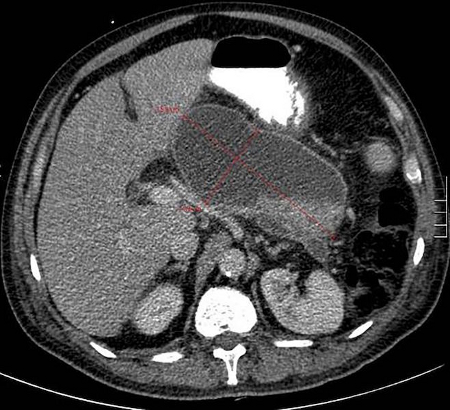Резюме
Definição
História e exame físico
Principais fatores diagnósticos
- abdominal pain
- nausea and vomiting
- anorexia
- signs of hypovolemia
Outros fatores diagnósticos
- signs of organ dysfunction
- Grey-Turner sign
- Cullen sign
- Fox sign
- abdominal distention
Fatores de risco
- middle-aged women
- young- to middle-aged men
- gallstones
- alcohol
- hypertriglyceridemia
- hypercalcemia
- use of causative drugs
- mumps
- coxsackievirus
- Mycoplasma pneumoniae
- endoscopic retrograde cholangiopancreatography (ERCP)
- trauma
- pancreas divisum
- pancreatic cancer
- sphincter of Oddi dysfunction
- family history of pancreatitis
Investigações diagnósticas
Primeiras investigações a serem solicitadas
- serum lipase (or amylase if lipase is unavailable)
- liver function tests
- CBC and differential
- hematocrit
- BUN and serum electrolytes
- arterial blood gas
- CRP
- transabdominal ultrasound
- chest x-ray
- ratio of serum lipase:amylase
- serum triglycerides
Investigações a serem consideradas
- abdominal CT scan
- magnetic resonance imaging/magnetic resonance cholangiopancreatography (MRI/MRCP)
- endoscopic ultrasound (EUS)
Novos exames
- procalcitonin
Algoritmo de tratamento
all patients
deteriorating or failing to improve
Colaboradores
Consultores especialistas
Scott Tenner, MD, MPH, JD, FACG
Clinical Professor of Medicine
Director, The Greater New York Endoscopy Surgical Center
Director, Brooklyn Gastroenterology and Endoscopy
State University of New York
NY
Declarações
ST is an author of references cited in this topic. He declares that he has no other competing interests.
Craig T. Tenner, MD, FACP
Associate Professor
Medicine
New York University School of Medicine
NY
Declarações
CTT declares that he has no competing interests.
Agradecimentos
Dr Scott Tenner and Dr Craig T. Tenner would like to gratefully acknowledge Dr Nicholas J. Zyromski, Dr Brian Daley, Dr Catherine Lindsay McKnight, and Dr Fernando Aycinena, previous contributors to this topic. They would also like to thank Dr Camille Blackledge for her contribution to this topic.
Declarações
NJZ is an author of a reference cited in this topic. BD, CLM, FA, and CB declare that they have no competing interests.
Revisores
Tamas A. Gonda, MD
Assistant Professor of Medicine
Attending Physician and Director of Research
Columbia University Medical Center
New York
NY
Declarações
TAG declares that he has no competing interests.
Alan Moss, MD
Harvard Medical Faculty Physician
Division of Gastroenterology
Beth Israel Deaconess Medical Center
Boston
MA
Declarações
AM declares that he has no competing interests.
Derek O'Reilly, MD
Consultant Hepatobiliary & Pancreatic Surgeon
Department of Surgery
North Manchester General Hospital
Manchester
UK
Declarações
DOR is an author of a reference cited in this topic. He declares that he has no other competing interests.
Eric Frykberg, MD
Professor
Department of Surgery
Division General Surgery
Shands Jacksonville Medical Center
FL
Declarações
At the time of the peer review, Dr E. Frykberg declared no competing interests. We were made aware that Dr Frykberg is now deceased.
Créditos aos pareceristas
Os tópicos do BMJ Best Practice são constantemente atualizados, seguindo os desenvolvimentos das evidências e das diretrizes. Os pareceristas aqui listados revisaram o conteúdo pelo menos uma vez durante a história do tópico.
Declarações
As afiliações e declarações dos pareceristas referem--se ao momento da revisão.
Referências
Principais artigos
Tenner S, Vege S, Sheth S, et al. American College of Gastroenterology guidelines: management of acute pancreatitis. Am J Gastroenterol. 2024 Mar 119(3):419-37.Texto completo Resumo
Leppäniemi A, Tolonen M, Tarasconi A, et al. 2019 WSES guidelines for the management of severe acute pancreatitis. World J Emerg Surg. 2019 Jun 13;14:27.Texto completo Resumo
Working Group IAP/APA Acute Pancreatitis Guidelines. IAP/APA evidence-based guidelines for the management of acute pancreatitis. Pancreatology. 2013 Jul-Aug;13(4 Suppl 2):e1-15.Texto completo Resumo
American College of Radiology. ACR appropriateness criteria: acute pancreatitis. 2019 [internet publication].Texto completo
Crockett SD, Wani S, Gardner TB, et al. American Gastroenterological Association Institute guideline on initial management of acute pancreatitis. Gastroenterology. 2018 Mar;154(4):1096-101.Texto completo Resumo
Artigos de referência
Uma lista completa das fontes referenciadas neste tópico está disponível para os usuários com acesso total ao BMJ Best Practice.

Diagnósticos diferenciais
- Peptic ulcer disease
- Perforated viscus
- Esophageal spasm
Mais Diagnósticos diferenciaisDiretrizes
- American College of Gastroenterology guidelines: management of acute pancreatitis
- American College of Gastroenterology guidelines: management of acute pancreatitis
Mais DiretrizesVideos
Venepuncture and phlebotomy: animated demonstration
Radial artery puncture animated demonstration
Mais vídeosFolhetos informativos para os pacientes
Pancreatitis, acute
Pancreatic cancer
Mais Folhetos informativos para os pacientesConectar-se ou assinar para acessar todo o BMJ Best Practice
O uso deste conteúdo está sujeito ao nosso aviso legal